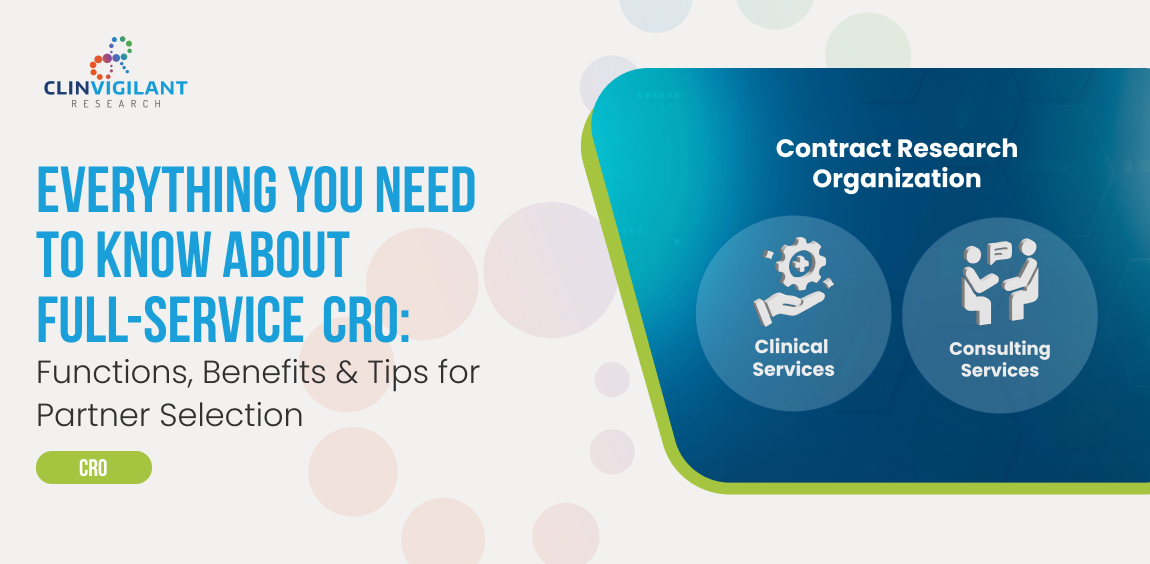
Clinical research plays a vital role in delivering new medicines, nutraceuticals, medical devices, and cosmetics to patients and consumers. However, navigating the clinical trial process is complex, requiring expertise, resources, and strict regulatory compliance. That’s why many organizations turn to Contract Research Organizations (CROs) for support.
Did you know that a significant portion of today’s clinical trials rely on CROs? These organizations provide essential services that ensure trials are conducted safely, efficiently, and successfully.
But not all CROs are the same. Understanding the difference between full-service CRO and niche CROs (such as data-focused providers) is crucial for sponsors, as the right partnership can directly influence trial outcomes.
So, what exactly is a full-service CRO, and how does it differ from specialized providers?
This article explores the concept, outlines the services they deliver, and highlights the advantages they offer to sponsors seeking trial success.
CRO stands for Contract Research Organization (sometimes also referred to as a Clinical Research Organization). A CRO is a company that assists the biotechnology, pharmaceutical, nutraceutical, medical devices, and cosmetics industries in conducting research safely and efficiently.
These organizations provide end-to-end support in areas such as study design, data management, physician oversight, and statistical analysis of clinical trial data. Their ultimate goal is to accelerate and strengthen research outcomes.
Partnering with a CRO ensures a smooth, organized, and professional experience throughout the clinical trial process, contributing to the growth of a global CRO market valued at over $105 billion.
A CRO In Clinical Research offers scientific and clinical support, as well as business services, to help clients conduct studies more efficiently. The Functions of Full-Service CRO can range across all phases of a drug’s life cycle, from preclinical research to post-approval monitoring.
CROs can be involved in the early drug research, target identification, validation, and IND-enabling studies. This provides a solid foundation for testing in humans.
CROs select the proper sites for trials, conduct feasibility studies, monitor sites, monitor trials, and recruit and retain patients. They ensure that the trial is well conducted.
A CRO In Clinical Research does not simply run clinical trials. They are essential to ensure that the drug development process is ethical, efficient, compliant, and ultimately successful at all stages of research.
CROs select the proper sites for trials, conduct feasibility studies, monitor sites, monitor trials, and recruit and retain patients. They ensure that the trial is well conducted.
Under product commercialisation, CROs help sponsors move beyond regulatory approval and ensure their therapies are ready for real-world adoption. They provide the evidence, insights, and support you need to maximize impact at launch and beyond.
CROs also help their sponsors in planning their products by analyzing needs in the market and the regulatory framework.
Medical writing encompasses the accurate and clear preparation of clinical documents, trial reports, regulatory submissions, and other written materials. They guarantee that all documents are in a form that is scientifically and regulatorily acceptable and can communicate the findings to interested parties.
There are different types of contract research organisations based on the range of services they provide and their areas of expertise. Choosing the right type depends on the sponsor’s needs and study requirements.
The Full Service CRO provides a wide range of services which will guarantee that the CRO runs clinical trial as smoothly and efficiently as possible, such as:
Choosing the right full-service CRO can make or break the success of your clinical trial. At Clinvigilant Research, we combine expertise, innovation, and commitment to ensure seamless trial execution and reliable outcomes, making us the trusted partner for sponsors worldwide.
Choosing the right Full-Service Contract Research Organization (CRO) is crucial for the success of clinical trials. A reliable CRO offers expertise in every phase, from study design to post-marketing surveillance, ensuring regulatory compliance, data integrity, and efficient trial execution.
As a full-service CRO, they streamline patient recruitment, data management, and regulatory compliance, while offering end to end clinical trial services and consulting. By partnering with the right CRO, sponsors can streamline processes, reduce costs, and accelerate time to market.
The right CRO will not only ensure a smooth trial but also support the development of safe, effective therapies, ultimately benefiting both patients and the healthcare industry.

Clinvigilant Research is a global full-service CRO (Contract Research Organization) dedicated to advancing clinical development with scientific precision and patient-centric solutions. With our end-to-end CRO services sponsors can accelerate time-to-market while maintaining the highest standards of quality and compliance. With global reach and deep therapeutic expertise, we partners with sponsors to bring safe, effective, and innovative therapies to patients worldwide.
| Cookie | Duration | Description |
|---|---|---|
| _wpfuuid | 11 years | This cookie is used by the WPForms WordPress plugin. The cookie is used to allows the paid version of the plugin to connect entries by the same user and is used for some additional features like the Form Abandonment addon. |
| cookielawinfo-checkbox-advertisement | 1 year | Set by the GDPR Cookie Consent plugin, this cookie is used to record the user consent for the cookies in the "Advertisement" category . |
| cookielawinfo-checkbox-analytics | 11 months | This cookie is set by GDPR Cookie Consent plugin. The cookie is used to store the user consent for the cookies in the category "Analytics". |
| cookielawinfo-checkbox-functional | 11 months | The cookie is set by GDPR cookie consent to record the user consent for the cookies in the category "Functional". |
| cookielawinfo-checkbox-necessary | 11 months | This cookie is set by GDPR Cookie Consent plugin. The cookies is used to store the user consent for the cookies in the category "Necessary". |
| cookielawinfo-checkbox-others | 11 months | This cookie is set by GDPR Cookie Consent plugin. The cookie is used to store the user consent for the cookies in the category "Other. |
| cookielawinfo-checkbox-performance | 11 months | This cookie is set by GDPR Cookie Consent plugin. The cookie is used to store the user consent for the cookies in the category "Performance". |
| CookieLawInfoConsent | 1 year | Records the default button state of the corresponding category & the status of CCPA. It works only in coordination with the primary cookie. |
| elementor | never | This cookie is used by the website's WordPress theme. It allows the website owner to implement or change the website's content in real-time. |
| viewed_cookie_policy | 11 months | The cookie is set by the GDPR Cookie Consent plugin and is used to store whether or not user has consented to the use of cookies. It does not store any personal data. |
| Cookie | Duration | Description |
|---|---|---|
| GetLocalTimeZone | session | No description |